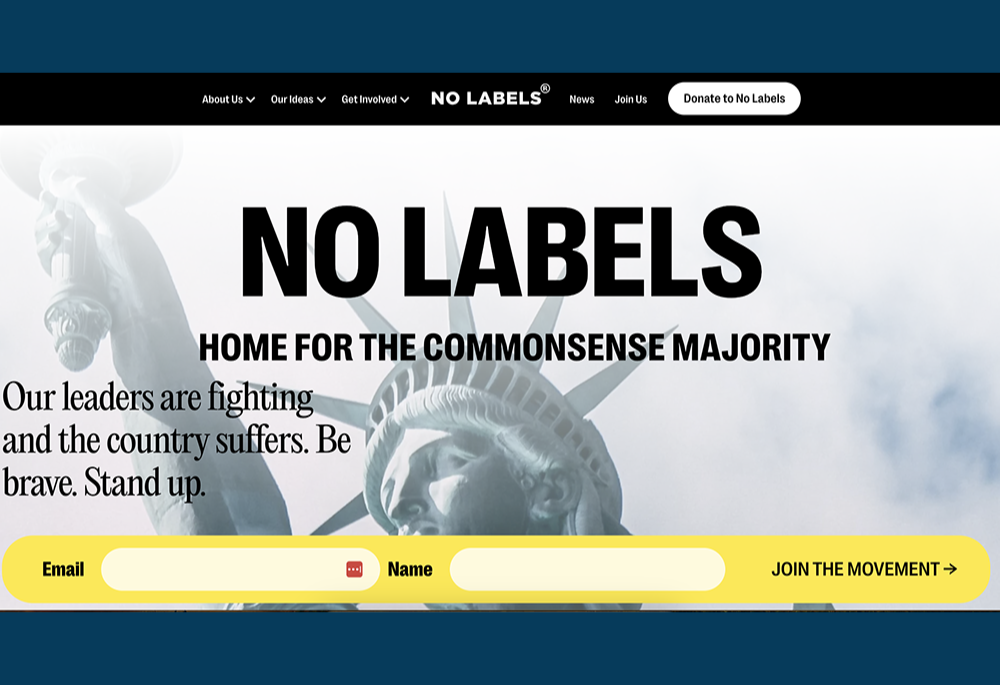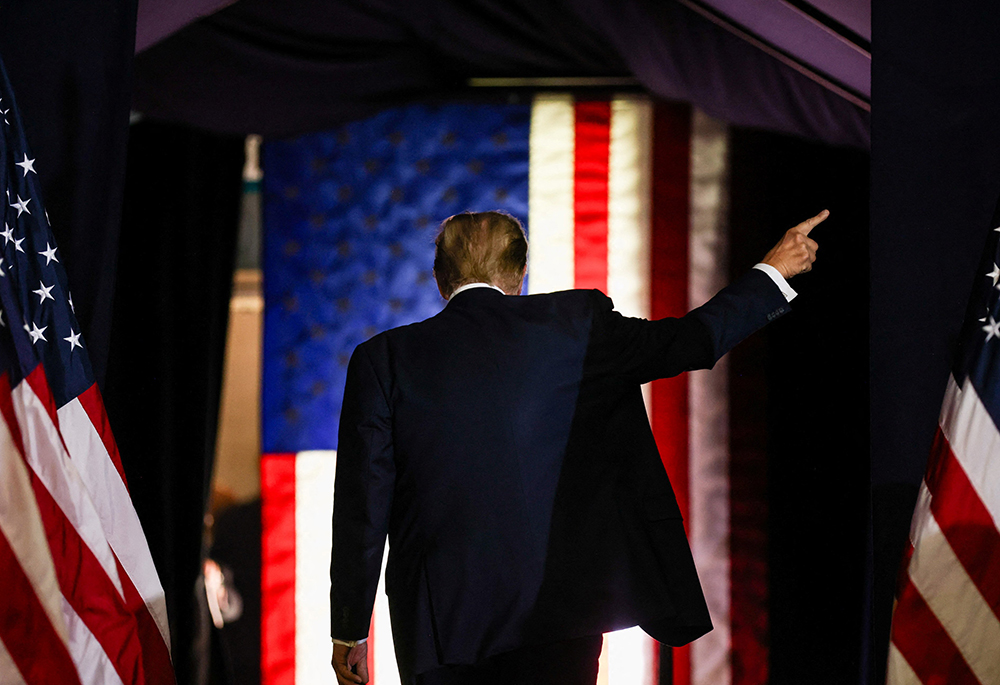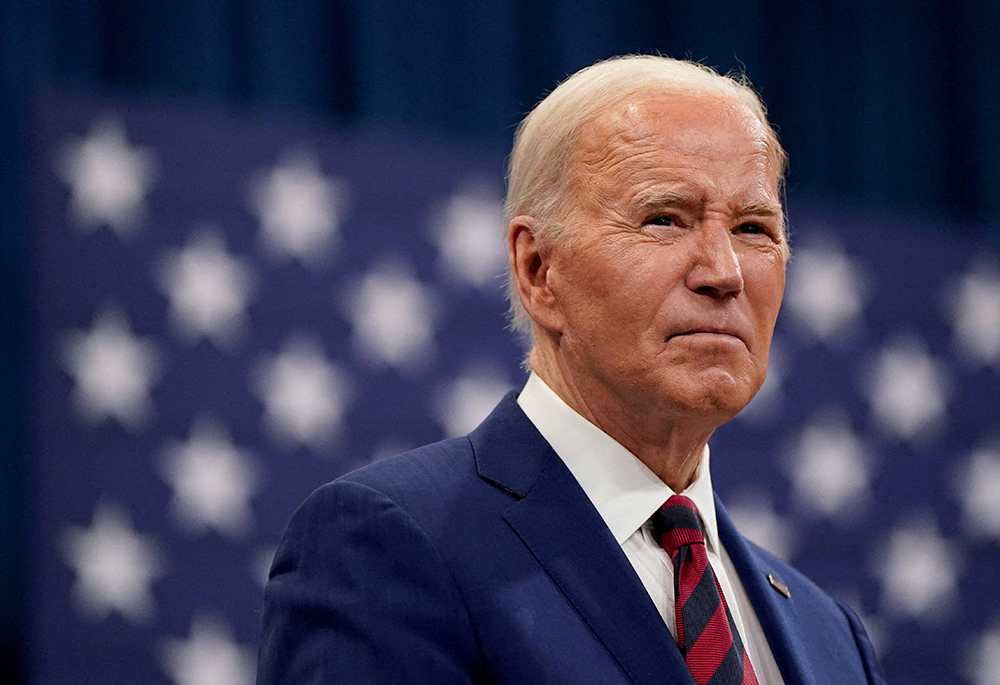
Screenshot of No Labels website (NCR screenshot/NoLabels.org)
Darn. I've been waiting by the phone, hoping No Labels would call and ask me to be on their national ticket. Now, the group has announced that it failed to find a viable candidate to put on the ballot in November and so they are essentially closing up shop for this year.
"Today, No Labels is ending our effort to put forth a Unity ticket in the 2024 presidential election. Americans remain more open to an independent presidential run, and hungrier for unifying national leadership, than ever before," the group announced last week (April 4). "But No Labels has always said we would only offer our ballot line to a ticket if we could identify candidates with a credible path to winning the White House. No such candidates emerged, so the responsible course of action is for us to stand down."
They are right about that last part: The choice this November is a binary one and throwing the election to Donald Trump, as a No Labels candidacy might well accomplish, is the opposite of the preservation of democracy to which the No Labels group pledged itself.

Republican presidential candidate and former U.S. President Donald Trump speaks as he holds a campaign rally at Coastal Carolina University ahead of the South Carolina Republican presidential primary in Conway, South Carolina, Feb. 10, 2024. (OSV News/Reuters/Sam Wolfe)
There were deeper problems with the group. They embodied the "centrist," faux middle of American politics, the same slot that Michael Bloomberg and Howard Schultz thought they could fill in 2020, before getting clobbered in the polls and acknowledging there was no lane respectively. The "moderate" angle is always presumed to be those who are pro-business and fiscally conservative, while espousing more liberal stances on social issues like abortion and LGBTQ rights.
Unfortunately for the urbane plutocrats, and for No Labels, most "swing voters" are actually more liberal on economic issues and more conservative on social issues — I call them "Pope Francis voters" — than the other way round. Lee Drutman put forward his persuasive breakdown of the electorate into four ideological quadrants after the 2016 election and it is still critical, with slight modifications, to his more recent analysis of congressional swing districts.
Republicans have been the pro-business party for so long, Trump's efforts to embrace more populist economic ideas never turned into policy changes, as Jonathan Chait demonstrated at New York magazine. Several Trump-affiliated politicians, like J.D. Vance, have pledged to pursue a more populist economic agenda and are being criticized for it from the GOP's libertarian wing. If Vance and his ilk were not so uncritical about Trump's fascistic tendencies, or the dangers of integralist political philosophy, they might be onto something.
Advertisement
President Joe Biden really has enacted some genuinely populist economic policies, or as he calls it, an economy built "from the middle out and bottom up." As Nick Hanauer detailed at Time magazine, "The long term impact of this Biden revolution could be a generational shift in how we talk about, think about, and manage the economy. The immediate impact is an economic strategy that, for the first time in decades, is focused on directly growing, supporting, and enriching the American middle class rather than vainly waiting for prosperity to trickle down."

U.S. President Joe Biden looks on during his visit at the Chavis Community Center March 26 in Raleigh, North Carolina. The White House issued a proclamation March 29 for the Transgender Day of Visibility, which is observed annually March 31 and coincided in 2024 with Easter. (OSV News/Reuters/Elizabeth Frantz)
Changing the economic reality for middle- and working-class workers is the first step in getting the Democrats back in touch with both their best selves and their only path to majority status. Biden needs to continue to distance himself from the extremists on social issues if he wants to seal the deal.
The No Labels group suffered from magical thinking. They thought they could turn Americans' dissatisfaction with politics in general and with the 2024 candidates in particular into an opening for a third party. But parties need to be rooted in ideas that correspond to the needs of constituencies, and that takes time. They thought they could short-circuit the process with a rock star. "No Labels was looking for a hero, and a hero never emerged," admitted the group's national director Joe Cunningham.
A strong people does not need a strong leader, except in times of duress. A weak people need a strong leader, and therein lies the danger of the moment. The desire for "a hero" reflects a specific self-perception, that we Americans are a weak people. I can argue either side of the case on the merits, but I fear that this self-perception, so easy to manipulate, might be self-fulfilling. It should, instead, invite us to dig deep and find what mettle still exists in the American soul and psyche.








